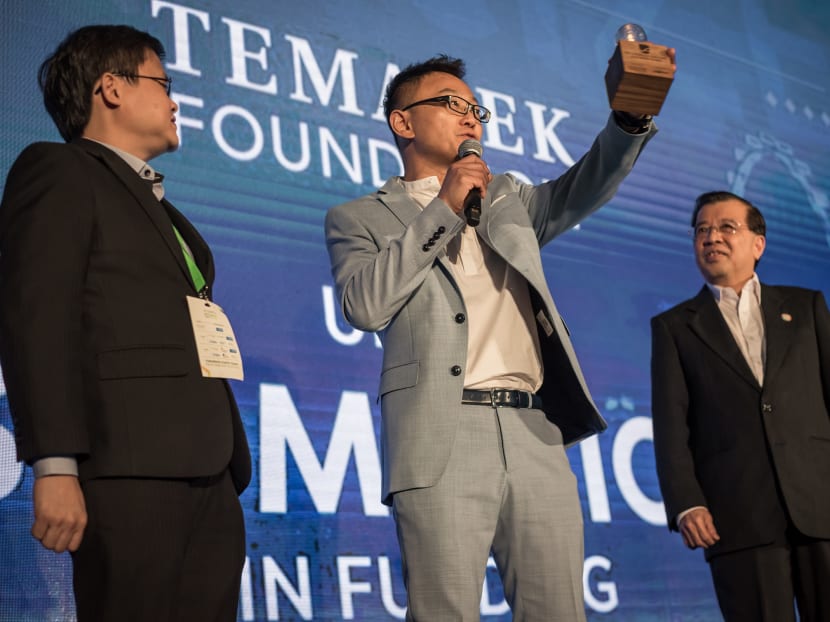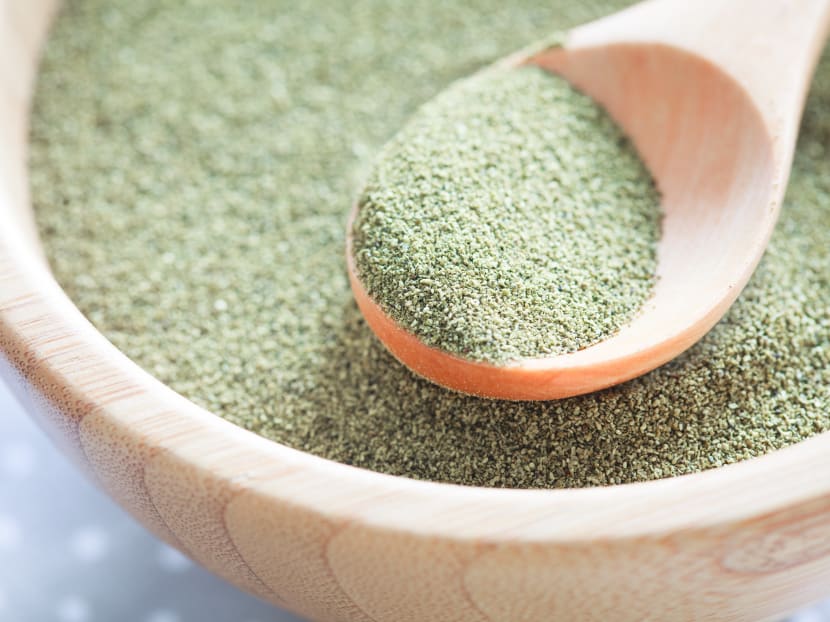How to grow food in a land-scarce country? A S$1m prize winner might have a space-age solution
SINGAPORE — His daughter is allergic to seafood protein, so Mr Eugene Wang created a substitute made from microalgae for her.

Winners of The Liveability Challenge 2019, co-founders of Sophie’s Kitchen, Mr Barnabas Chan (left) and Mr Eugene Wang (centre), with Mr Lim Hock Chuan, Chief Executive of Temasek Foundation Ecosperity.
SINGAPORE — His daughter is allergic to seafood protein, so Mr Eugene Wang created a substitute made from microalgae for her.
But the self-professed “space fan” had bigger dreams.
“I was actually thinking of using (it) as a space food and possibly even using it for a Mars expedition in the future,” Mr Wang told TODAY.
While a manned flight to Mars might be light years away, Mr Wang’s creation could soon be used closer to home.
On Friday (June 7), the microalgae protein won the 51-year-old Taiwanese and his team from Sophie's Kitchen a cool S$1 million at The Liveability Challenge (TLC) 2019 final that was held on the last day of this year’s Ecosperity Week. They beat six other teams.
The challenge, which was presented by Temasek Foundation and organised by digital media company Eco-Business, was a global call for proposals to address critical sustainability issues.
It saw more than 300 submissions from 51 countries.
The theme for the second edition of this competition, launched on Jan 10 this year, focused on energy and circular economy solutions suited to densely packed urban centres such as Singapore.
ALTERNATIVE PROTEIN THAT TASTES LIKE SEAWEED
For the competition, Mr Wang, the founder of the California-based Sophie’s Kitchen, presented a proposal for a plant-based protein made with microalgae that is fermented using food waste such as spent grains from tofu makers and breweries, and even molasses from sugar refineries.
“All of these things are economically available to big cities around the world,” said Mr Wang, who added that they are safe and hygienic.
“We’re not talking about restaurant or household food waste… but down the road, (if regulations allow) we could possibly use it to make animal feed,” he said.
Mr Wang added that the product, which tastes like seaweed, could be used by companies that require protein as an ingredient such as plant-based food makers, supplement manufacturers and even cosmetic companies.
NO SPACE? NO PROBLEM
Producing the microalgae-based protein requires only 0.02 hectares of space — roughly the size of a tennis court. By comparison, 141 hectares of land is needed to produce a ton of beef.
“Using fermentation to grow protein allows you to go vertical. So there's virtually no limit,” said Mr Wang.
And unlike in traditional agricultural farms, it is not manpower intensive. Mr Wang said just one or two people are needed to manage 10 to 20 tanks, while everything else is automated.
It is even possible to manage the tanks remotely from another country, Mr Wang added.
Aside from saving space, about 90 per cent of the water used for creating the microalgae can be recycled.
These are all features he believes is perfect for a land-scarce country that is concerned about food security and reducing its carbon footprint. Or even a space flight in the future.
As Mr Wang said: “How do you manage a seven or eight-year travel without carrying too much food?”
His solution: Microalgae produced through the waste from astronauts.
“This microalgae that's going to be eaten by astronauts will be purified. It will be clean. So there's no hygiene issue,” said Mr Wang as he mused about the possibilities.
“I think this is really a revolutionary technology that the world needs to see.”

However, it will still be some time before the alternative protein from Sophie’s Kitchen hits retail shelves.
Mr Wang plans to use the prize money to quickly ramp up the scale of his operations, with a fermentation facility in Singapore, and hopes to roll out the company’s alternative protein within two to three years.
By then, he said the cost should be comparable to soy protein today.
A PLASTIC FREE FUTURE?
Meanwhile, last year’s TLC winner, RWDC Industries, has seen a surge in interest in its plastic-alternative solution from food and beverage companies, among others.
Mr Xiao Zhaotan, the Asia Pacific president of the Singapore materials company, told TODAY that its product, called Solon, is completely biodegradable.
Made from polyhydroxyalkanoates, a polyester made in the natural world, it degrades from “microbial action” and leaves no trace behind.
“It gets completely eaten up, digested and metabolised into carbon dioxide and water,” said the 38-year-old Singaporean.
Yet, Solon is also a robust, heat resistant and moldable material that Mr Xiao said has hundreds of possible applications that require plastic.
RWDC has produced a drinking straw made from Solon, which was made available in Singapore for a limited time during the Ecosperity Week.
It will still be some time before Solon-made products become commercially available.








